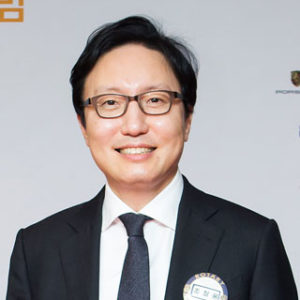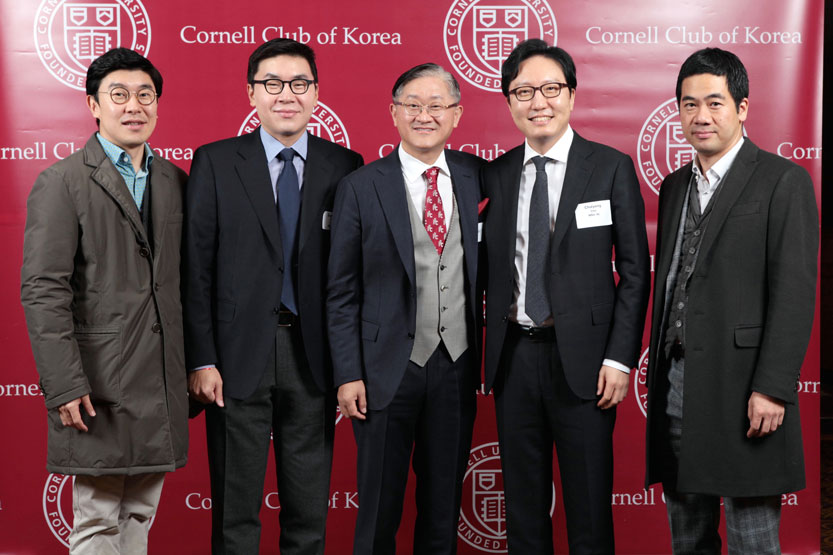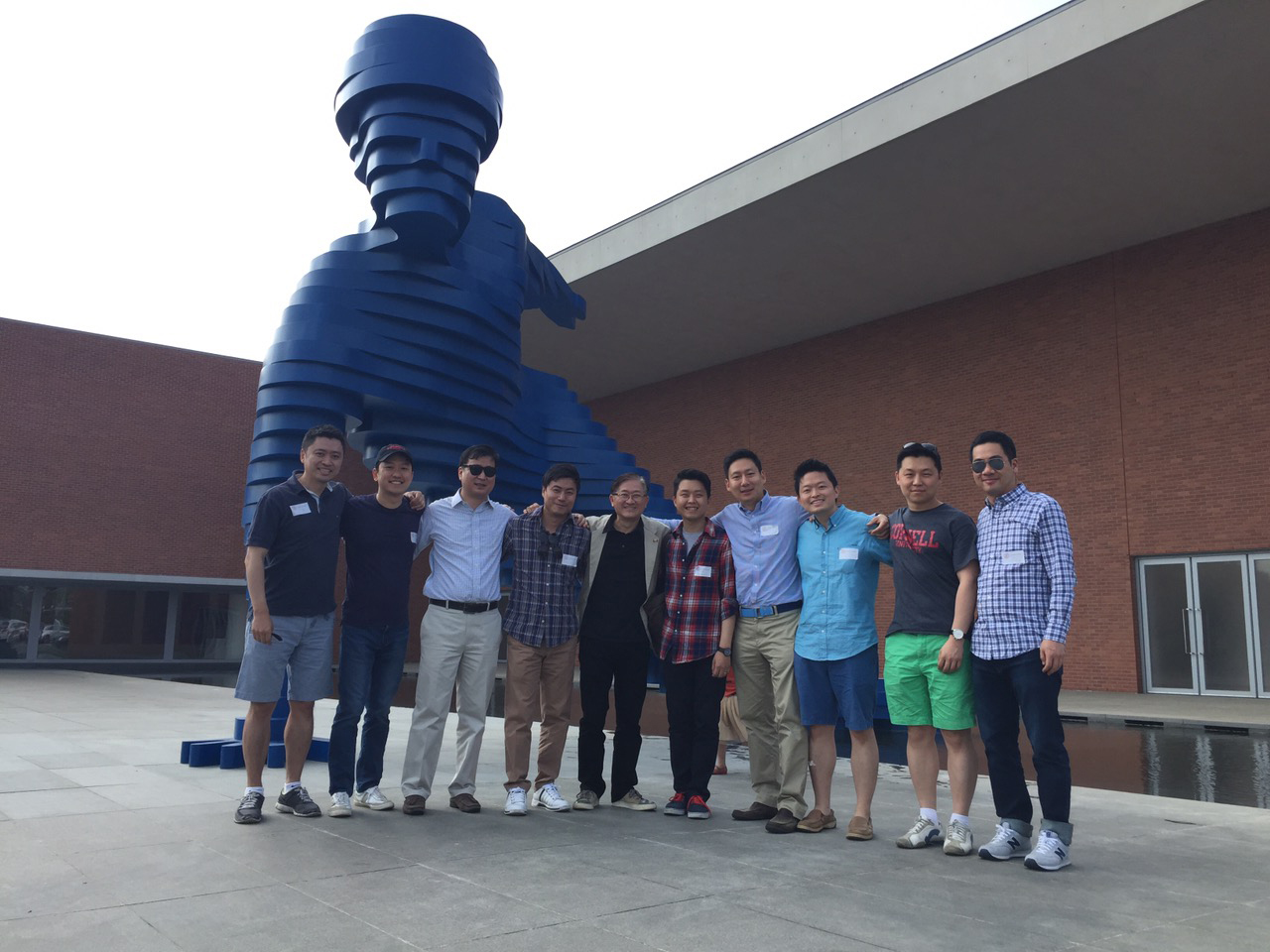Johnson Club of Korea to be honored with Johnson’s Henry P. Renard ’54, MBA ’55 Regional Alumni Club of the Year Award
Thanks to the team led by Chulyong Cho, MBA ’98, the Johnson Club of Korea is strengthening its relationships with alumni and Johnson.

By Irene Kim
When Chulyong Cho, MBA ’98, stepped up as the new president of the JohnsonClub of Korea, he began to implement significant changes. For more than 20years, the club had been operating affably enough, holding two meetings and two golf outings annually – primarily informal social gatherings. But Cho, president and CEO of logistics company Dongwoo International, had participated in the club since graduating and wanted to improve the organization, in part by doubling the number of meetings and greatly enhancing their networking and educational value. “When I became the president, I set my vision to make the club a good community where the Johnson alumni in Korea can interact with, and learn from, each other,” he says.
Cho also increased the club’s officers from three to eight, augmenting the team and making the roles more specialized. This helped break up and systematize leadership tasks, while providing each officer with some overlap and backup, explains SungYoon Woo, MBA ’08, CEO and cofounder of private-equity firm Credian Partners and the club’s VP of communication for Johnson. “Each officer has a main focus, but we all share ideas and we’ll fill in for others when they need help.”
“The Johnson Alumni Club of Korea is an amazing model of organization, hospitality, and school pride,” says Sean Scanlon, associate dean of Alumni Affairs and Development. “When I visitedSeoul in September, I was impressed with Club President Chulyong Cho as well as the seven other officers who coordinate their membership lists, events, and communications with the broader Cornell Club of Korea.”

The club holds four quarterly meetings plus two golf outings per year. Before each quarterly event, the officers meet to discuss the program and decide on a guest speaker. “It’s helpful to have collective ideas from a relatively large group, as this brings in new ideas,” Woo says. Cho’s change in focus and the brainstorming sessions have exponentially increased the networking and learning content of the meetings. “For example, a strategist in the equity market might share a market outlook for the year, or a consultant at a prominent consulting firm could analyze success and failure cases of leadership. At other times, entrepreneurs might introduce their new venture to the attendees,” says Woo.
“These sessions, without exception, are followed by Q&A and discussion sessions that remind us of our time in the Johnson classroom,” he adds. “We believe that these new programs are a success due to the fact that alumni come not only to meet their old friends, but also to learn something new.”

Cho’s team also improved the club’s communications with its members. In addition to notifying alumni of events via email, they now also use a local social networking service provider, Naver Band, which allows club members to freely post messages or pictures and exchange ideas. “SNS makes it easier to communicate with the group, as it makes mobile access easy and addresses any concerns about the privacy issues of Facebook,” says Woo.
Meeting attendance has grown from about 20-30 alumni in previous years to about 40-50 alumni, says Woo, and its makeup has changed considerably. “Not that many young alumni would attend in the past, but now, as the number of recent graduates is increasing, the number of young alumni attending is increasing,” Woo explains.In fact, the number of Johnson alumni in Korea has grown rapidly, more than doubling in the last eight years to well over 200.
The improved quality of meeting content plus the better notification system have also contributed to attendance growth, Woo points out.A big draw is one of the club’s most steadfast attendees, Kyung-BaeSuh, MBA ’87, president and CEO of multibillion-dollar global cosmetics firm AmorePacific, who is always willing to address his fellow alumni and provide valuable business advice.
As the Johnson Club of Korea has grown its membership and engagement level with local alumni, it has also strengthened its connection with Johnson. When Dean Soumitra Dutta recently visited Korea with AssociateDean Scanlon and Director Banoo J. Parpia of Cornell Alumni Affairs andDevelopment, club members set up an interview for the dean with Maeil Business News (South Korea’s equivalent of the Wall Street Journal),increasing Johnson’s footprint in the Korean press and enhancing the dean’s global media coverage. In addition, “Dean Dutta, Associate Dean Scanlon, and Director Parpia provided an update on what was happening at the school, as well as listened to what our alumni had to say. They made us feel connected with the school,” says Woo.
“Every one of our alumni feels good that he or she graduated from Johnson. They’re proud to be part of the Johnson community,” Woo says.”And the Johnson community in Korea just gets better and better. I feel good to be part of that development.”
“Johnson alumni and all Cornellians should be proud of theJohnson alumni in Korea,” says Scanlon.
“Working with the seven other officers of the leadership team, I have tried my best to foster the Johnson community,” says Cho. About receiving the Henry P. Renard ’54, MBA ’55 Regional Alumni Club of the YearAward, he adds: “I’d like to express my sincerest thanks to the club leadership team members who have offered strong support despite their busy career and family activities. And we all thank the school for this recognition.”
